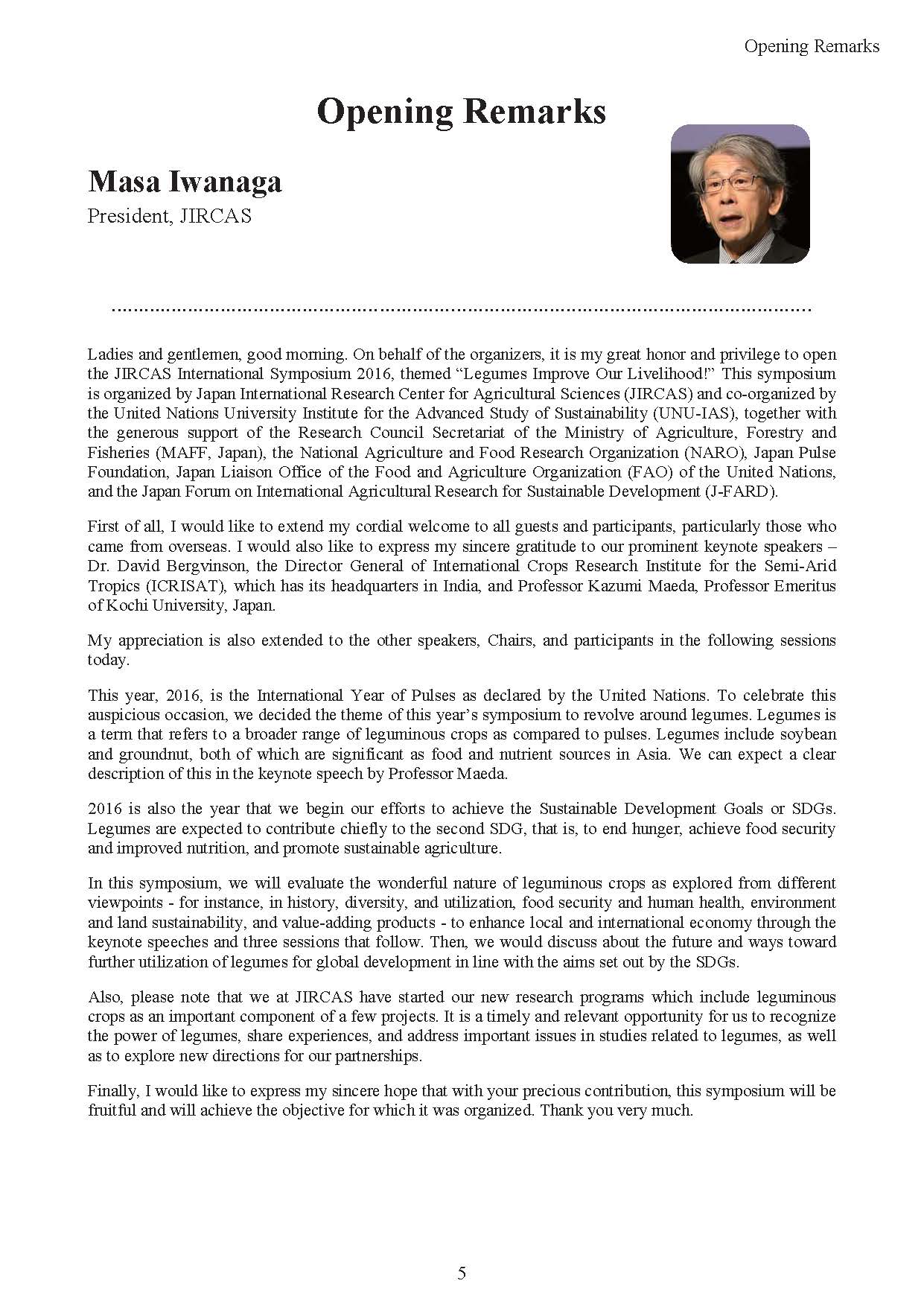Opening Remarks

Ladies and gentlemen, good morning. On behalf of the organizers, it is my great honor and privilege to open the JIRCAS International Symposium 2016, themed “Legumes Improve Our Livelihood!” This symposium is organized by Japan International Research Center for Agricultural Sciences (JIRCAS) and co-organized by the United Nations University Institute for the Advanced Study of Sustainability (UNU-IAS), together with the generous support of the Research Council Secretariat of the Ministry of Agriculture, Forestry and Fisheries (MAFF, Japan), the National Agriculture and Food Research Organization (NARO), Japan Pulse Foundation, Japan Liaison Office of the Food and Agriculture Organization (FAO) of the United Nations, and the Japan Forum on International Agricultural Research for Sustainable Development (J-FARD).
First of all, I would like to extend my cordial welcome to all guests and participants, particularly those who came from overseas. I would also like to express my sincere gratitude to our prominent keynote speakers – Dr. David Bergvinson, the Director General of International Crops Research Institute for the Semi-Arid Tropics (ICRISAT), which has its headquarters in India, and Professor Kazumi Maeda, Professor Emeritus of Kochi University, Japan.
My appreciation is also extended to the other speakers, Chairs, and participants in the following sessions today.
This year, 2016, is the International Year of Pulses as declared by the United Nations. To celebrate this auspicious occasion, we decided the theme of this year’s symposium to revolve around legumes. Legumes is a term that refers to a broader range of leguminous crops as compared to pulses. Legumes include soybean and groundnut, both of which are significant as food and nutrient sources in Asia. We can expect a clear description of this in the keynote speech by Professor Maeda.
2016 is also the year that we begin our efforts to achieve the Sustainable Development Goals or SDGs. Legumes are expected to contribute chiefly to the second SDG, that is, to end hunger, achieve food security and improved nutrition, and promote sustainable agriculture.
In this symposium, we will evaluate the wonderful nature of leguminous crops as explored from different viewpoints - for instance, in history, diversity, and utilization, food security and human health, environment and land sustainability, and value-adding products - to enhance local and international economy through the keynote speeches and three sessions that follow. Then, we would discuss about the future and ways toward further utilization of legumes for global development in line with the aims set out by the SDGs.
Also, please note that we at JIRCAS have started our new research programs which include leguminous crops as an important component of a few projects. It is a timely and relevant opportunity for us to recognize the power of legumes, share experiences, and address important issues in studies related to legumes, as well as to explore new directions for our partnerships.
Finally, I would like to express my sincere hope that with your precious contribution, this symposium will be fruitful and will achieve the objective for which it was organized. Thank you very much.
| Date of issued | |
|---|---|
| Creator | Masa Iwanaga |
| Publisher | Japan International Research Center for Agricultural Sciences |
| Available Online | |
| Issue | 2016 |
| spage | 5 |
| epage | 5 |
| Rights | Japan International Research Center for Agricultural Sciences |
| Language | eng |
